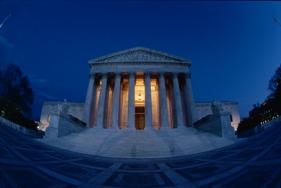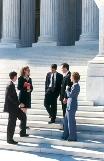Law School Program Helps Students Land Coveted Clerkships
By PAUL WACHTER
For some aspiring lawyers, gaining acceptance to a prestigious law school may be the most statistically difficult hurdle they face in their legal careers. Those who hope to score a federal clerkship face even longer odds.
“Each year, I get between 700 and 800 applicants for three spots,” Federal Judge Denny Chin of the Southern District of New York (SDNY) told an audience at a recent panel titled Judicial Clerkships: A View from the Bench. Chin, joined by Hon. Stephen Robinson, also of the SDNY, and Hon. Ann Claire Williams of the U.S. Court of Appeals for the 7th Circuit, offered a unique perspective on clerkships and advice on how to improve applicants’ chances.
| Columbia Law School graduates clerking at the Supreme Court |
The recent panel discussion was opened by Dean David M. Schizer, himself a former clerk for Justice Ruth Bader Ginsburg on the U.S. Supreme Court. Schizer noted that no other law experience open to young graduates was likely to offer the same challenges as clerkships, an American institution launched by Supreme Court Justice Horace Gray in 1882.
“After law school, if you join a firm, you’ll be busy but you’re not going to have the same degree of responsibilities,” Schizer said. “But a clerkship gives you a lot of experience in different areas, and since there’s a small staff you’re given a lot of responsibility.”
Clerks also get to spend a lot of hours in court, seeing how the law is practiced, Robinson added. “It helps you see what is good lawyering and what is bad lawyering in a whole bunch of different types of situations.”
Among the other panels this spring are: Clerkship Tips from the Hon. Anita Brody ’58 (Eastern District of Pennsylvania); The Nuts and Bolts of Applying for a Clerkship; A Clerkship Roundtable with Hon. Debra Livingston (a judge on the 2nd Circuit and a Columbia Law Professor) and Hon. Kenneth Karas ’91 (SDNY) and their clerks; and a luncheon with the Hon. Susan Braden of the Court of Federal Claims in Washington, D.C.
When applying for clerkships, which traditionally is done by 3Ls on the Tuesday after Labor Day, it’s helpful to know what judges are looking for in a candidate. The panel offered audience members the following tips:
- In addition to good grades and excellent writing skills, judges place a lot of weight on recommendations. “Don’t just go to the popular professor, who may be writing five recommendations for the same clerkship spot,” Chin said. “I’m only going to take one of the candidates, at most, and it’s often the one that the professor has a hand-written note on the bottom of the recommendation, identifying his top pick of the bunch.”
- As few as two percent of applicants are summoned for interviews, which is primarily a test to see if a candidate’s personality is compatible with the judge’s. While some judges allow applicants between a day and a week to entertain an offer, a few make “exploding” offers, meaning that it is rescinded if a candidate walks out the door without accepting. In general, it’s considered poor form to turn down an offer.
- Applicants should not be obsequious. “It’s very important to tell me what you really think, since what I’m looking for in a clerk is someone who isn’t afraid to point out somewhere where they think I’ve gone wrong,” Williams said.
- Neither should applicants make assumptions about a judge’s politics based on who appointed him or her. “Even though I was appointed by President [George W.] Bush, I’m a Democrat,” Robinson said. “I had one guy come into the interview and talk about how conservative he was, which wasn’t a good idea.”
- Don’t rule out a clerkship for financial considerations. “I understand that most clerks start out with a salary of about $50,000 and if you join a big firm you can get $160,000 plus the bonus,” Williams said. Increasingly, she added, graduates are working in a firm for a year or two and then applying for a clerkship. “Firms are fine with this, since its prestigious for them to have lawyers who have clerked. Plus, they give you a $50,000 clerkship bonus.”
- If you first don’t succeed, reapply or consider clerkships with state courts, where there are more openings.
“Looking back at myself as a student, I wouldn’t have made the cut to clerk for myself,” Robinson said with a chuckle. “Some of these clerks I’m hiring are smarter than me. But fortunately it takes them a year to figure this out, and then they’re gone.”
PHOTO CREDITS: Dustin Ross (top) and Bill Denison (side)

